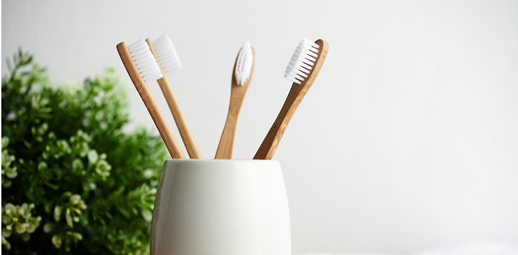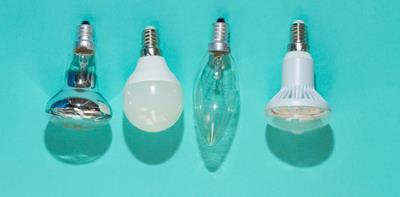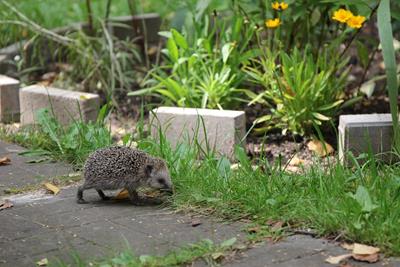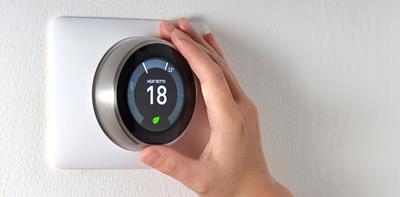
With climate change more frequently in the news now, many of us are becoming increasingly aware of what we can do to try and make a difference.
One of the easiest ways to reduce your impact on the environment is to swap some of the products you regularly use at home for greener alternatives.
You don’t need to make any drastic changes. Just try to use more sustainable and environmentally-friendly versions of the products and services you already rely on.
Here are ten easy swaps to get you started.
1. Replace your plastic toothbrush with a bamboo one
Every single piece of plastic ever made still exists - and that includes all of your manky old plastic toothbrushes.
It may not have even crossed your mind to find an alternative. But next time you need a new toothbrush, just choose a greener, bamboo one. Easy.
2. Shun the supermarket and grow your own
Why not save on packaging and transport and grow some of your own fruit and veg.
You don’t need a large garden: you can grow salad crops, herbs and some vegetables in window boxes, pots or growing bags.
There are plenty of guides for absolute beginners who have little space to grow their own, such as this one from the Guardian.
Given you’re probably not going to grow everything yourself, you could also try and buy more of your fruit and veg from local producers to reduce emissions.
3. Switch to green, refillable cleaning products
Cleaning products are full of all sorts of nasty chemicals which aren’t great for the environment, plus they also tend to use lots of plastic.
So, you could try switching to using refills of eco-friendly cleaning products. Find out if there is a zero-waste shop near you or sign up to a subscription service offering a refill service.
If you’re looking online for eco-friendly household products, try a site like Ethical Superstore.
4. Use alternatives to wet wipes
When there’s a giant ‘fatberg’ in the news headlines, wet wipes that have been flushed down the loo are often among the culprits.
Wipes often contain plastic, and unlike loo paper they won’t disintegrate in water.
Some alternatives to standard wipes include wipes made from bamboo which are biodegradable and are free from plastic or chemicals. Or perhaps could you stop using wipes altogether and instead opt for washable and re-usable cloths. For removing make up, you could try using reusable pads, cloths or mitts.
5. Switch to eco friendly toilet paper
Recycled paper and bamboo toilet tissue subscriptions suddenly became popular during lockdown. But they deserve to stay on your shopping list for good.
Options include Who Gives a Crap (WGAC), Bumboo, The Cheeky Panda and The Naked Sprout, among others.
6. Use reusable cling film alternatives
Do you still use reels of clingfilm to envelop your sarnies or cover over leftovers?
It can be hard to break old habits, but there are alternatives. These include reusable silicone lids for covering food and beeswax wraps, which you wash after each use and can last for up to a year if you look after them.
If you have school-age children, it can be worth buying a decent lunchbox with lots of compartments, so you won’t feel the need to wrap each component of their lunch.
7. Give over some of your lawn to the wild side
Sustainability is also about helping to encourage and protect nature. If you have a garden there is plenty you can do to help achieve that.
One small step is take a break from mowing. You don’t have to abandon your whole lawn to let it grow wild, but you could allow part of it to grow naturally without human interference. Then sit back and watch the marvellous variety of wildlife it attracts.
8. Have your milk delivered
If you have a lot of heavy milk drinkers in your family, you can get through several pints a week, and that can mean a lot of plastic cartons.
So why not get your milk delivered in glass bottles that can be reused? It means you’ll get fresh milk and can also be really convenient. For example, Milk and More allows you to order up to 9pm and get milk and other groceries delivered to your doorstep by 7am the next morning. Plus, it can feel pleasingly retro.
Another advantage of having your milk delivered is that you avoid regularly popping to the shop to pick up some milk – a trip that can often result in a few extra purchases.
9. Replace your shower head with an efficient one
Swapping a bath for a shower is a good step towards reducing water use and saving energy.
However, you can go one step further and replace your shower head with an energy efficient alternative. These mean you use less water, but the pressure doesn’t suffer so you won’t feel any difference.
According to Energy Saving Trust, switching to a water efficient, regulated shower head can reduce your water usage by around 40 litres a day, but aren’t suitable for electric showers[1].
10. Switch to a green energy provider
Many energy suppliers offer green tariffs, which can either mean they’ll match your home energy usage with renewable energy generation or they will contribute towards environmental schemes on your behalf.
There has been a lot of confusion over which tariffs are genuinely green, with some suppliers accused of ‘greenwashing’. To help you choose the right one, comparison service uSwitch has created an accreditation scheme for renewable tariffs, classing them as bronze, silver and gold - for the greenest tariffs available[2].
For tips on how to stay happy and safe in your home, go to Solved.
[1] https://energysavingtrust.org.uk/top-seven-water-saving-products-to-help-you-cut-water-use/
[2] https://www.uswitch.com/gas-electricity/green-energy/green-accreditation/


